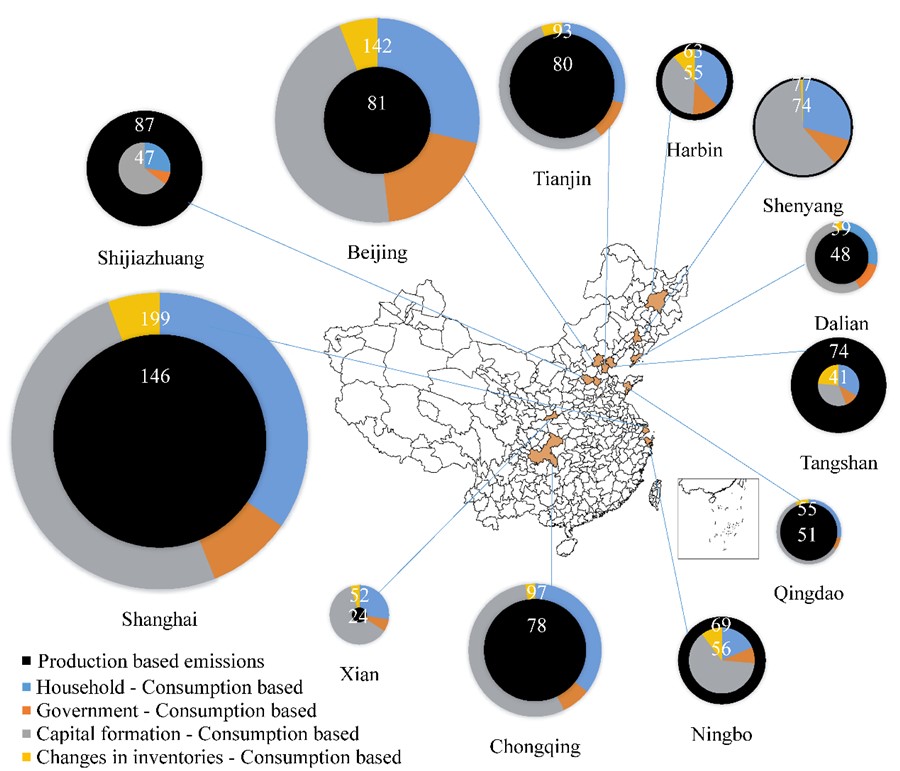
Recently, in the 2017 International Conference on Applied Energy held in Britain, Consumption-based Emission Accounting for Chinese Cities by Mi Zhifu, Yuan Xiaochen and Wei Yiming in CEEP and other scholars is granted Applied Energy 2016 Highly Cited Original Paper. This paper was published in the prestigious academic journal Applied Energy in 2016. [ Mi Z, Zhang Y, Guan D, Shan Y, Liu Z, Cong R, Yuan X, Wei Y. Consumption-based emission accounting for Chinese cities. Applied Energy. 2016, 184: 1073-1081.]

Carbon emission accounting includes production-based and consumption-based accounting. At present, "Kyoto Protocol" "Paris Agreement" and other international climate agreements and each nation’s climate policy generally adopt production-based accounting. Consumption-based accounting can assess carbon emission generated by final consumption activities of human and figure out relationship between consumption capacity & structure and carbon footprint. It will help to reveal the impact of human activities on global climate change in the terminal consumption sector, which is the basic work of research on emission from carbon production to consumption.
Consumption-based accounting has played an increasingly essential role in preventing carbon leakage, encouraging technology diffusion, improving cost effectiveness, and enhancing equity. Currently, consumption-based emission research focused on the global, national and provincial level, while consumption-based emission research on the urban level is relatively rare.
The author employs the input-output method to calculate the consumption-based emission of 13 cities in China, including Beijing, Shanghai, Tianjin, Chongqing, Harbin, Shijiazhuang, Xi'an, Qingdao, Tangshan, Shenyang, Dalian, Ningbo and Hengshui. The results show that urban consumption not only generates carbon emissions within the region, but also contributes to the growth of carbon emission in other regions via regional trade. More than 70% of the consumption-based emission in metropolitan such as Beijing, Shanghai and Tianjin is transferred from other regions. As a result, interregional synergies are critical to address climate change. The state is now actively carrying out carbon trading market pilot work, and plans to establish a unified carbon market in 2017, which provides a good opportunity for interregional collaboration to reduce emission in China.
Urban carbon emission differs significantly under two methods. For relatively developed cities which are often consumption-oriented, the consumption-based emission far outnumbers than the production-based. For example, the consumption-based emission of Beijing and Shanghai are 1.7 and 1.4 times the production-based respectively. On the contrary, for the less developed production-oriented cities, the production-based emissions exceeds the consumption-based a lot. For example, Shijiazhuang and Tangshan’s production-based emission are both 1.8 times the consumption-based. Consequently, the carbon accounting method confers a significant impact on the responsibility distribution of mitigating climate change. Two accounting methods should be considered in mind to formulate a more equitable and effective policy in response to climate change.

In the long run, the production-oriented city will turn into the consumption-oriented one with the social and economic development. Based on this trend, more and more production-oriented cities in China will become consumption-oriented. This means that more emission will be transferred to rural areas or abroad. Therefore, the policymaking in response to climate change should account for the coordinated reduction of urban and rural areas.
This study is accomplished by Mi Zhifu, Yuan Xiaochen, Wei Yiming and other scholars. Research work is supported by China’s National Key R&D Program “Integrated Impact Assessment of Climate Change on Economic System”, “Energy Economics and Climate Policies” Innovative Research Group accredited by Natural Science Foundation of China and other projects.